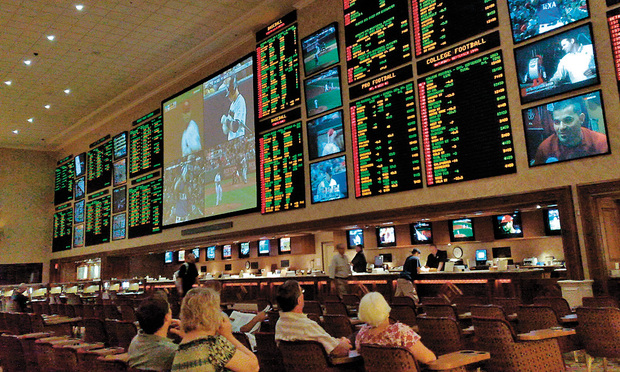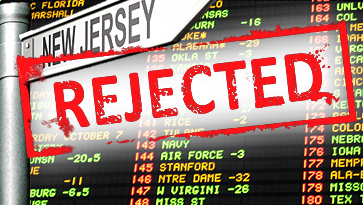Nj Sports Gambling Law
| Long title | An Act to prohibit sports gambling under State law, and for other purposes. |
|---|---|
| Acronyms(colloquial) | PASPA |
| Nicknames | Bradley Act |
| Enacted by | the 102nd United States Congress |
| Effective | October 28, 1992 |
| Citations | |
| Public law | 102-559 |
| Statutes at Large | 106 Stat.4227 |
| Codification | |
| Titles amended | 28 U.S.C.: Judiciary and Judicial Procedure |
| U.S.C. sections created | 28 U.S.C.ch. 178 § 3701 et seq. |
| Legislative history | |
| |
| United States Supreme Court cases | |
| Struck down by U.S. Supreme Court in Murphy v. National Collegiate Athletic Association on May 14, 2018 | |
The Professional and Amateur Sports Protection Act of 1992 (Pub.L.102–559), also known as PASPA or the Bradley Act, is a judicially-overturned law that was meant to define the legal status of sports betting throughout the United States. This act effectively outlawed sports betting nationwide, excluding a few states.
The sports lotteries conducted in Oregon, Delaware, and Montana were exempt, as well as the licensed sports pools in Nevada[1]. In addition, Congress provided a one-year window of opportunity from the effective date of PASPA (January 1, 1993) for states which operated licensed casino gaming for the previous ten-year period to pass laws permitting sports wagering. The latter exception was clearly crafted with New Jersey in mind. However, New Jersey failed to take advantage of this opportunity. Excluded from the reach of PASPA are jai alai, as well as parimutuelhorse and dog racing.
In a May 2018 decision in Murphy v. National Collegiate Athletic Association, the Supreme Court of the United States ruled that PASPA conflicts with the Tenth Amendment.
History[edit]
Supreme Court rules that states can legalize sports betting. The court upholds the legality of a 2014 New Jersey law permitting sports betting at casinos and racetracks in the state. Chris Christie signed legislation Friday that partially repeals the state's sports betting prohibitions and clears the way for casinos and racetracks to begin taking bets as soon. The NJ sports-betting law requires that there is an 8.5% tax charged on revenue generated from sports-betting in the state. A 13% tax is charged on the revenue from land-based casinos and a 14.25% tax charge on revenue from racetrack related sporting venues. A potential 2021 ballot question is already in the works, as New Jersey lawmakers move to amend the state constitution to allow sports betting on major college games. New jersey online sports betting license has crossed the milestone with a rapid boom in the sports betting industry. In June 2018, Gov. Phil Murphy signed NJ sports betting into law and made new jersey online sports betting legal in the country. The seven-year struggle came to an end after sports betting became legal in the state.
On June 26, 1991, the Senate Judiciary Subcommittee on Patents, Copyrights and Trademarks held public hearings on sports gambling. It found '(s)ports gambling is a national problem. The harms it inflicts are felt beyond the borders of those States that sanction it.' David Stern, the then-commissioner for the National Basketball Association, testified that 'The interstate ramifications of sports betting are a compelling reason for federal legislation.' In light of these findings, Congress exercised its authority under the Commerce Clause to enact Senate Bill 474 Professional and Amateur Sports Protection Act (PASPA) in 1992, codified at 28 U.S.C. § 3701.[2]
Legislative efforts against the act[edit]
New Jersey has been a leader, both in legislation and in the legal process, in support of the legalization of sports betting in New Jersey despite its original failure to take advantage of the carve out in the PASPA of 1992. The law is also known as the 'Bradley Act', named for New Jersey Senator and former NBA star Bill Bradley. New Jersey voters in 2011 voted for a state constitutional amendment that would permit sports gambling. The next year, the NJ State Legislature enacted the Sports Wagering Act ('2012 Act'), allowing sports wagering at New Jersey casinos and racetracks.[3]
Legal challenges[edit]

Proponents of repeal typically assert that the law as written is inherently unconstitutional, as the Tenth Amendment of the U.S. Constitution reserves to the states all rights not explicitly granted to the federal government—such as gambling regulation. While the primarily legal challenge to the law came from New Jersey, other efforts to overturn it had been set in motion before the Supreme Court's decision in May 2018; this included a sports-betting bill being introduced in Kentucky[4], as well as the other states who are in the process of creating and or passing some form of sports betting legislation and the formation of the pro-repeal American Sports Betting Coalition, a lobby alliance which includes the American Gaming Association and the National Indian Gaming Association.[5]
PASPA was formally challenged in the state of New Jersey. In March 2009, New Jersey State Senator Raymond Lesniak filed a lawsuit in the United States District Court for the District of New Jersey claiming, among other things, that the PASPA unconstitutionally discriminated among the states by allowing four states to offer sports betting while disallowing the other forty-six states from enjoying the privilege; however the case was dismissed as the court argued that only then-Governor Chris Christie could bring the suit, and at that time, Christie believed it would be difficult to challenge the law.[6] A 2010 referendum showed overwhelming support by state voters to legalize sports gambling,[7] and by 2012, the state passed a law that would allow for sports gambling at licensed locations.[8] This law was challenged by the National Collegiate Athletic Association, the National Basketball Association, the National Football League, the National Hockey League, and Major League Baseball in August 2012, arguing their new law violated PASPA.[9] The state argued that they knew their law likely violated PASPA, but argued that PASPA itself violated the Tenth Amendment's protection against anti-commandeering federal laws that stripped the power of the state to repeal their own sports gambling ban.[10] This case, heard in the United States District Court for the District of New Jersey, found for the sports leagues, dismissing the state's claims regarding PASPA.[11] New Jersey appealed the decision. On September 17, 2013, the Third Circuit Court of Appeals, in a decision by Judge Julio M. Fuentes, found for the sports leagues, again ruling that the state law violated PASPA and enjoined the state from enacting the law.[12] However, the Appeals Court also ruled that PASPA did not prevent New Jersey from repealing any existing laws it had.[13]
Based on the Appeal Court's comment, New Jersey, now with Governor Christie's blessing, passed a new law in 2014 that repealed a former state law that banned sports gambling.[13] The four leagues and the NCAA filed suite against this new law, again arguing that it violated PASPA. The leagues and the NCAA prevailed both at District Court and at an en banc decisions from the Third Circuit by August 2016, leading the state to petition the Supreme Court of the United States to hear the case.[14] New Jersey appealed this case to the United States Supreme Court, requesting examination of PASPA under the anti-commandeering provisions of the Tenth Amendment.[15]
The Supreme Court accepted the case in June 2017[16] and heard oral arguments in December 2017;[17] during this time, Governor Christie stepped down and was replaced by Phil Murphy; the case before the court became Murphy v. National Collegiate Athletic Association. The case was combined with a separate petition NJ Thoroughbred Horsemen v. NCAA, representing commercial interests related to PASPA. The Court ruled in May 2018 in a 7-2 decision that parts of PASPA were unconstitutional as they commandeered power from the states, and in a 6-3 decision, determined that the whole of PASPA was unconstitutional.[18][19]
References[edit]

- ^Lambert, Troy (July 18, 2017). 'Supreme Gamble: The Professional and Amateur Sports Protection Act'. Huffington Post.
- ^Rodefer, Jeffrey (March 5, 2007). 'Sports Protection Act'. gambling-law-us.com. Retrieved July 24, 2017.
- ^Johnson, Brent (October 17, 2014). 'Christie signs law allowing sports betting in N.J.'The Star-Ledger. Retrieved July 24, 2017.
- ^'New Kentucky Bill Would Legalize Sports Betting In Bluegrass State'. Legal Sports Report. September 20, 2017. Retrieved October 24, 2017.
- ^'Tribal, Commercial Casino Alliance On Sports Betting Gains Momentum'. Legal Sports Report. September 25, 2017. Retrieved October 24, 2017.
- ^Spoto, MaryAnn (September 25, 2011). 'Casino, horse racing leaders push for legalization of sports betting in N.J.'The Star-Ledger. Retrieved March 16, 2018.
- ^Spoto, MaryAnn (November 8, 2011). 'Sports betting backed by N.J. voters'. The Star-Ledger. Retrieved March 16, 2018.
- ^Friedman, Matt (January 17, 2012). 'Gov. Christie signs bill allowing gamblers to place bets on pro, college sports teams'. The Star-Ledger. Retrieved March 16, 2018.
- ^Heitner, Darren (August 7, 2012). 'Constitutionality Of Sports Betting Prohibition At Issue In NCAA And Professional Leagues' Lawsuit Against New Jersey'. Forbes. Retrieved July 24, 2017.
- ^Schamis, Axel; Van Bramer, Katherine. 'Christie v. National Collegiate Athletic Association'. Legal Information Institute. Retrieved March 18, 2018.
- ^Drape, Joe (March 27, 2013). 'Cash-Hungry States Eye Sports Betting, to Leagues' Dismay'. The New York Times. Retrieved July 24, 2017.
- ^'Appeals Court Upholds Constitutionality Of New Jersey Sports Betting Ban'. United States Department of Justice. September 17, 2013. Retrieved July 24, 2017.
- ^ abPurdum, David; Rodenberg, Ryan (March 3, 2018). 'The odds of legalized sports betting: New Jersey vs. the leagues'. ESPN. Retrieved March 16, 2018.
- ^Johnson, Brent; Salant, Jonathan (August 9, 2016). 'N.J. loses again in quest to bring sports betting to state'. The Star-Ledger. Retrieved July 23, 2017.
- ^'Christie v. National Collegiate Athletic Association'. SCOTUSblog. Retrieved July 26, 2017.
- ^Johnson, Brent; Salant, Jonathan (June 28, 2017). 'U.S. Supreme Court agrees to hear N.J. sports betting case'. The Star-Ledger. Retrieved July 22, 2017.
- ^'The NJ Sports Betting Case Gets Its Day In SCOTUS: What We Learned'. Legal Sports Report. December 4, 2017. Retrieved December 5, 2017.
- ^Purdum, David (May 14, 2018). 'Supreme Court strikes down sports betting law'. ESPN. Retrieved May 14, 2018.
- ^Maese, Rick (May 14, 2018). 'Analysis What the Supreme Court's sports gambling decision means'. The Washington Post. ISSN0190-8286. Retrieved May 14, 2018.
External links[edit]
- Opinion for Murphy v. National Collegiate Athletic Assn. (16-476) from SupremeCourt.gov
- Professional and Amateur Sports Protection Act of 1992, Chuck Humphrey, Gambling Law US

Lottery and Gambling Winnings
Winning the Lottery or scoring on a sports wager can change your life in profound ways. Congratulations on your lucky break!
Just remember that your good fortune includes a responsibility to pay taxes and fees on those winnings.
Gambling Winnings:
In 2018, Governor Phil Murphy signed a law that authorized legal sports betting in New Jersey. The law (A4111) allows people, age 21 and over, to place sports bets over the internet or in person at New Jersey's casinos, racetracks, and former racetracks. Sports betting is now among the many forms of gambling winnings that are subject to the New Jersey Gross Income Tax, including legalized gambling (sports betting, casino, racetrack, etc.) and illegal gambling.
Lottery:
New Jersey Lottery winnings from prize amounts exceeding $10,000 became subject to the Gross Income Tax in January 2009.
New Jersey Income Tax is withheld at an amount equal to three percent (3%) of the payout for both New Jersey residents and nonresidents (N.J.S.A.
 54A:5.1(g)).
54A:5.1(g)). Withholding Rate from Lottery Winnings
The rate is determined by the amount of the payout. If a prize is taxable (i.e., over $10,000), the entire amount of the payout is subject to withholding, not just the amount in excess of $10,000. The withholding rates for gambling winnings paid by the New Jersey Lottery are as follows:
- 5% for Lottery payouts between $10,001 and $500,000;
- 8% for Lottery payouts over $500,000; and
- 8% for Lottery payouts over $10,000, if the claimant does not provide a valid Taxpayer Identification Number.
Companies that obtain the right to Lottery payments from the winner and receive Lottery payments are also subject to New Jersey withholdings. Each company is required to file for a refund of the tax withheld, if applicable.
LotteryNew Jersey Lottery winnings from prize amounts exceeding $10,000 are taxable. The individual prize amount is the determining factor of taxability, not the total amount of Lottery winnings during the year.
- For example, if a person won the New Jersey Lottery twice in the same year, and the winning prize amounts were $5,000 and $6,000, these winnings would not be subject to New Jersey Gross Income Tax. However, if that person won the Lottery once and received a prize of $11,000, the winnings would be taxable.
- This standard for taxability applies to both residents and nonresidents.
- The New Jersey Lottery permits donating, splitting, and assigning Lottery proceeds to someone else or to a charity. If you choose to donate, split, or assign your Lottery winnings, in whole or in part, the value is taxable to the recipient in the same way as it is for federal income tax purposes.
Making Estimated Payments
If you will not have enough withholdings to cover your New Jersey Income Tax liability, you must make estimated payments to avoid interest and penalties. For more information on estimated payments, see GIT-8, Estimating Income Taxes.
Nj Sports Gambling Locations
Out-of-State Sales:
Out-of-state lottery winnings are taxable for New Jersey Gross Income Tax purposes regardless of the amount.
Gambling winnings from a New Jersey location are taxable to nonresidents. Gambling includes the activities of sports betting and placing bets at casinos and racetracks.
Calculating Taxable Income
You may use your gambling losses to offset gambling winnings from the same year as long as they do not exceed your total winnings. If your losses were greater than your winnings, you cannot report the negative figure on your New Jersey tax return. You must claim zero income for net gambling winnings. For more information, see TB-20(R), Gambling Winnings or Losses.
You may be required to substantiate gambling losses used to offset winnings reported on your New Jersey tax return. Evidence of losses can include your losing tickets, a daily log or journal of wins and losses, canceled checks, notes, etc. You are not required to provide a detailed rider of gambling winnings and losses with your New Jersey tax return. However, if you report gambling winnings (net of losses) on your New Jersey return, you must attach a supporting statement indicating your total winnings and losses.
Nj Sports Gambling Lawyers
Reporting Taxable Winnings
Include taxable New Jersey Lottery and gambling winnings in the category of “net gambling winnings” on your New Jersey Gross Income Tax return.